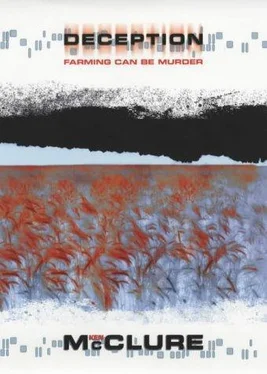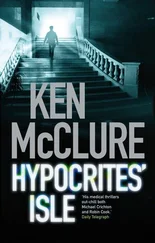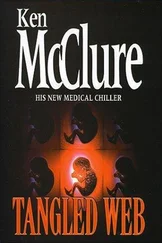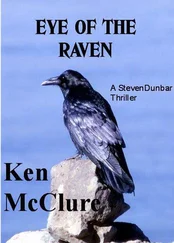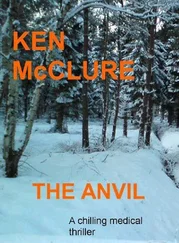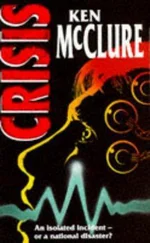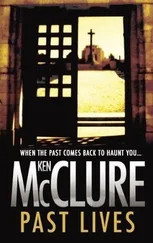Agrigene, through Macey and Elms, were contesting this finding, ‘most vigorously’ but adjudication in the matter was currently being impeded by the changing political scene in Scotland. The newly formed Scottish parliament now held jurisdiction over matters agricultural through its newly formed Ministry for Rural Affairs but it had been the Ministry of Agriculture Food and Fisheries (MAFF), answering to the Westminster parliament, which had granted the licence. There was also confusion over who held executive sway over major matters concerning health and safety.
‘All I need,’ sighed Steven. ‘A bloody civil service squabble in the middle of a grey area.’
He examined the map of the village and surrounding area supplied by Miss Roberts and noted that the farms were indeed very close. The prevailing west wind in that part of the world might well constitute a problem but even then, a theoretical one, he thought. The idea of large-scale gene transfer through natural pollination was much more remote than the tabloid newspapers would have people believe. It was however, too late for cogent argument on this subject, he conceded. Public opinion had clearly perceived a danger in the genetic modification of food sources so the matter of who was right and who was wrong had become largely irrelevant. ‘Don’t waste your time concentrating on what should be,’ was something he remembered from his early training, ‘concentrate on what is .’
He gleaned very little in the way of extra information from the supplied copies of solicitors’ letters. All were couched in the cold, unemotional jargon of legal prose and said no more than they absolutely had to. He looked to the background reports on the two farmers for some more colour.
Ronald Lane was a fifty-three year old, who had returned to Blackbridge from South Africa, where he had been an estate manager for many years. He had come home after inheriting Peat Ridge farm from his late father. He had trained in the early sixties at Edinburgh’s School of Agriculture but had apparently fallen out with his father at the time over what he saw as old-fashioned farming methods being used on Peat Ridge. The pair had never been reconciled and Lane junior had gone off to seek his fortune abroad.
He was said to be generally disliked in the village since his homecoming, being seen as ‘uppity’ and an outsider, despite his roots, and as a consequence, kept himself very much to himself. He had remained unmarried and lived alone apart from his housekeeper, a local woman named, Agnes Fraser.
Thomas Rafferty of Crawhill Farm had lived all his forty-eight years in the village, having left school at sixteen to join his father and brother in working on Crawhill Farm. Although he had had to work hard when his father — a notoriously stern man — had been alive, he and his brother, Sean, had preferred to spend most of their time in the pub after the old man’s demise. Consequently, the farm had been allowed to go into decline.
Sean however, had been shrewd enough to see that there was a market for the hire of heavy farm machinery in the area. He had persuaded his brother that they should invest what remained of their capital in the purchase of agricultural machinery and set up a plant hire business. The idea blossomed into a business success and Rafferty’s Plant Hire had provided both brothers with a comfortable income for many years, which they had not seen fit to augment with the bother of doing any actual farming. Crawhill had been allowed to lie fallow.
Sean had died in 1991 and Thomas had bought out his widow’s share, leaving him and his wife, Trish as the sole proprietors of the plant hire business. Without Sean’s business acumen however, the plant hire business had not being doing so well of late. Thomas had not recognised the need to invest in new machinery or keep up expensive maintenance schedules on the old stuff. He preferred to make do with what they had and keep it going on a shoestring budget, using second hand spares and a succession of poorly paid mechanics to fit them.
It had come as a surprise to everyone when Thomas Rafferty announced that he was planning on resurrecting Crawhill as a working farm and an organic one at that. The fact that the land had not been cultivated at all for many years meant that it could be considered free of modern chemical contamination and therefore eligible for an organic accreditation, which it had now been granted.
Steven read on and noted that the licensing dates for Agrigene’s trial pre-dated Rafferty’s organic farm accreditation by quite some time. Some pen — pusher’s mistake? he wondered. Right hands not knowing what left hands were doing? This was a fact of life in any large administration and, in this case, he could see an added complication. The setting up of the new Scottish Parliament’s infrastructure had not, as far as he could tell, led to the demise of the old one, administered by the Scottish Office. He could be dealing here with permutations of two left hands and two right hands. Not a happy thought.
Steven moved on to the lab report from the ministry lab that had carried out the analysis on the oil seed rape crop and immediately thought it odd. It appeared that the analysis had been carried out at the instigation of the protestors. Why should a MAFF lab agree to do that? Did such labs carry out private work routinely? he wondered. He would check up on that, but even if that were the case, there must have been an original analysis carried out on the crop before the licence for the trial was granted. A comparison of the original and the latest one was surely all that was required to demonstrate whether the crops were the same or not, but the original was missing from the file. A copy of the licence itself was present and gave details of the two foreign genes that had been introduced to the grain. They had been inserted in order to enable the plant to tolerate a range of powerful herbicidal chemicals, most importantly, glyphosphate and glufosinate-ammonium weed killers. The use of these herbicides would completely suppress weeds in the fields and permit much higher yields of the crop.
‘And a bloody good idea, too,’ though Steven as he read on through the MAFF analysis. The two foreign genes were highlighted in the DNA sequence but so was a third, marked in a different colour. This apparently was the bone of contention between the two parties. The protestors, through Rafferty’s solicitors, were arguing that this area represented a third, undeclared gene and therefore rendered the licence invalid. The biotech company however, maintained that this was a misunderstanding and that the DNA sequence was not being interpreted correctly.
Steven was no molecular biologist but he did understand the principles involved in genetic engineering. In particular he appreciated the structure of DNA, the blueprint of life, and knew about the specificity of restriction enzymes that cut the molecule at particular sites. He understood the technical procedures involved in the cutting out of genes from one DNA molecule and the pasting of them into another.
This gave him an advantage over any lay investigator and, in this instance, enabled him to wonder why the supposed third gene had not been identified and described by the analysing lab. They had just classified it as a ‘foreign element’ in the report.
Although one stretch of DNA sequence looked pretty much like any other to the naked eye — an apparently endless, alternating alphabet of only four letters, A,T,C, and G, representing backbone of the molecule — many computerised databases had been set up to analyse these strings of letters and compare them with the DNA sequences of known genes. The lab had obviously run the sequence through a database in order to classify the suspect third section as foreign but they had not given any indication as to what it might be or where it might have come from. Steven wondered why not.
Читать дальше
